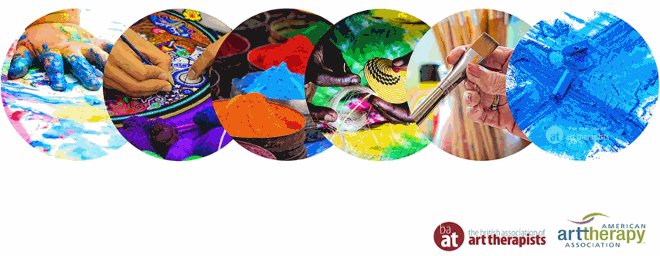 We are delighted to publish this special issue of the International Journal of Art Therapy (IJAT) on the International Art Therapy Practice/Research Inaugural Conference. Now, more than ever, in the midst of the COVID-19 pandemic, we are acutely aware of the importance of sharing knowledge globally in order to facilitate the development of effective interventions for the growing number of people in need of services.
We are delighted to publish this special issue of the International Journal of Art Therapy (IJAT) on the International Art Therapy Practice/Research Inaugural Conference. Now, more than ever, in the midst of the COVID-19 pandemic, we are acutely aware of the importance of sharing knowledge globally in order to facilitate the development of effective interventions for the growing number of people in need of services.
Organised by IJAT’s learned society, the British Association of Art Therapists (BAAT) in partnership with the American Art Therapy Association (AATA), this inaugural conference aimed to exchange knowledge, approaches and experience creating an exciting opportunity to share the depth and breadth of art therapy practice and research occurring throughout the world.
The conference was held on 11–13th July 2019 in London and was attended by more than 700 delegates from over 35 countries. Each day of the conference began with delegates coming together for keynote sessions followed by a rich programme of practice and research presentations, round table discussions, masterclasses, and workshops spanning numerous active and emerging topic areas in the field of art therapy.
Included in this special issue are five peer-reviewed papers, written on topics presented by the authors at the inaugural conference: two research papers; and three conference presentations on innovative practice. Although we are not able to include papers from all 35 countries, these five papers describe art therapy with a diverse range of service users, settings and approaches: dyadic art therapy with parent-infants in UK, US and Canada (Armstrong & Ross, Citation2020); mentalization-based art therapy with children in an inner city community primary school in London, England (McDonald & Holttum, Citation2020); socially engaged frontline art therapy with refugees in Calais, France (Lloyd & Usiskin, Citation2020); art therapy integrating sex therapy and Emotionally Focused Therapy (EFT) with couples in the US (Metzl, Citation2020); and art therapy informed by the Hearing Voices Movement (HVM), which began in Holland, with people in the UK who hear voices, often with a ‘psychosis-related’ psychiatric diagnosis (Wood, Citation2020).
The special issue has enabled us to share just a few of the myriad of art therapy practice and research presentations. However, you can also read reports of all the keynotes and round table discussions from the three-day conference within the supplementary material for this editorial:
Day one
The social imperative in art therapy research: claiming spaces, transforming narratives (Prof Lynn Kapitan).
The missing social theory: towards an embodied, socially-embedded, aesthetic in art therapy research and practice (Prof Ephrat Huss).
Arts in health and arts therapies as fundamental to health strategy (Lord Howarth of Newport).
Unifying and promoting the arts for health and wellbeing (Dr Donna Betts).
What can arts therapies contribute to public health? (Prof Susan Hogan).
Arts therapies and arts in health: identity, partnerships and growth (round table discussion chaired by Prof Sarah Deaver and including Alex McDonald, Deirdre McConnell, Unnur Ottarsdottir, Gina Alfonso, Beth Gonzalez-Dolginko).
Day two
Interpersonal biology in health and wellness (Dr Rodney Adeniyi-Jones And Dr Neil Springham).
Art therapy in education: challenges, opportunities and best practice (round table discussion chaired by Dr Donna Betts and including Tammy Sheila, Ben Pearce, Jenny Regan, Dr David O’Flynn, Victoria Hume, Dr Val Huet).
Day three
The divided brain and the power of the implicit (Dr Iain McGilchrist).
Adaptive response theory: a bio-psycho-social framework for art therapy clinical research and practice (Assoc Prof Girija Kaimal).
Art therapy and neuroscience (Assoc Prof Juliet King).
Behaviour, homeostasis and art (Assoc Prof Christianne Strang).
We hope you will enjoy this special issue. We thank the authors and reviewers for their professional work and contributions. We are also thankful to all the presenters at the International Art Therapy Practice/Research Inaugural Conference for sharing their innovative and knowledgeable contributions; Val Huet (CEO at BAAT) for her creative and tireless work in conceptualising and producing this ground-breaking international conference; the AATA for their partnership; and the BAAT staff team and volunteers for their commitment and hard work turning this invaluable international platform for sharing knowledge into reality.
The International Art Therapy Practice/Research Conference is now set to become a biennial event!
International Art Therapy Practice/Research Inaugural Conference Report
Download PDF (1.9 MB)References
- Armstrong, V. G., & Ross, J. (2020). The evidence base for art therapy with parent and infant dyads: An integrative literature review. International Journal of Art Therapy, 25(3), 103–118. https://doi.org/10.1080/17454832.2020.1724165
- Lloyd, B., & Usiskin, M. (2020). Reimagining an emergency space: Practice innovation within a frontline art therapy project on the France-UK border at Calais. International Journal of Art Therapy, 25(3), 132–142. https://doi.org/10.1080/17454832.2020.1786417
- McDonald, A., & Holttum, S. (2020). Primary-school-based art therapy: A mixed methods comparison study on children’s classroom learning. International Journal of Art Therapy, 25(3), 119–131. https://doi.org/10.1080/17454832.2020.1760906
- Metzl, E. (2020). Art therapy with couples: integrating art therapy practices with sex therapy and emotionally focused therapy. International Journal of Art Therapy, 25(3), 143–149. https://doi.org/10.1080/17454832.2020.1774628
- Wood, C. (2020). Acceptance in the Hearing Voices Movement: How might this be relevant for art therapy service-users? International Journal of Art Therapy, 25(3), 150–158. https://doi.org/10.1080/17454832.2020.1795697
